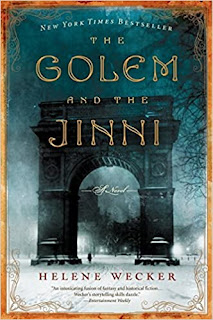The Hidden Palace
by Helene Wecker
It is not every day that a book of this caliber comes along. I tried to savor it, to read it slowly, really hear the words in my head, but I confess that I stayed up late Sunday night rushing through the ending. If you haven’t read The Golem and the Jinni, I highly recommend you go and read that one before reading this one. I promise you it will be worth it.
You can find my review of the original book here https://storymusing.blogspot.com/2020/04/book-review-golem-and-jinni.html
A quick recap – In The Golem and the Jinni we
meet the main characters, Chava Levy, who was created to be a bride for a man
who dies on the ocean crossing to America, and the Jinni, Ahmad al-Haidid, who
was bound with iron by a wizard and ended up in a flask that was sent to
America. Chava and Ahmad meet in New York during the early part of the 20th
century. There is a myriad cast of neighborhood characters where Chava lives,
where the Jinni lives, and even up town, where Sophia Winston lives.
In this book, we add in Kreindal Altschul, a young
woman whose rabbi father creates another golem to take to Europe to help his
people, but never has the chance. Kreindal ends up in an orphanage, master of a
golem in hiding.
Sophia returns, somewhat changed and continuing to
change over the course of the novel as she travels to the Middle East in search
of treatments or a cure for her ailment. She comes into contact with a Jinniyeh,
who is much like the Jinni was in the beginning, arrogant and a loner,
concerned only with her own well-being and needs.
Chava’s friend Anna Blumberg returns with her son,
Toby. There are limits to Anna’s friendship with Chava. She knows what Chava is
and what she can do, has seen it, and her first priority is always keeping Toby
safe, sometimes to his detriment.
Maryam and Sayeed Fadoul, purveryors of a small coffee
shop in Little Syria also return, trying to run interference between the people
of the neighborhood and the strange power they know Ahmad holds.
Things are a bit tense between Chava and Ahmad now. He's
restless and becoming irritable. They tend to debate and squabble just as part
of their relationship. They also have very different perspectives of the world,
she was literally created to serve while his entire existence is founded on
being a creature of whimsy with little natural constraints because of his
power. He naturally chafes at the restraints from time to time in this
different type of existence.
I've loved every little interlude and vignette that
make up the fully realized whole. Wecker is a fantastic story teller. She
brings history to life in a fantastical story. Her sidelong description of the Triangle
factory fire is heartbreaking as we see how it affects people in the story. The
storyline is at once fresh and original, the plot surprising and yet
reasonable, so that one thinks, ah, of course that happened, after it
happens.
I can’t recommend this book, and the first, highly
enough. I look forward to the next one though I fear it will be few years before
it is ready.








